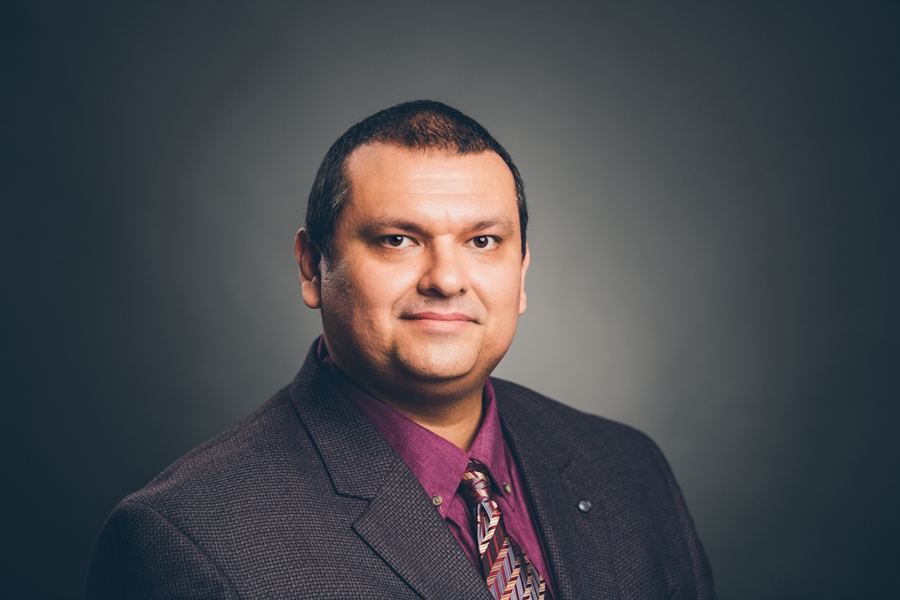A biomedical engineering researcher has been awarded $450,000 from the National Institutes of Health to investigate non-genetic processes that can impact how tumors respond to treatment.
Leonard Harris, assistant professor of biomedical engineering, joined the Department of Biomedical Engineering in August.
Harris' research focuses on understanding how cancer cell populations evolve over time, with the idea that tumor cells diversify into subsets with a variety of different properties. Some of those subsets may be more resistant to cancer-fighting drugs, making the cancer more effective at combatting treatment efforts.
Harris' work seeks to learn more about those changes, so doctors can employ more effective treatment methods.
"A well-known characteristic of tumors is they are heterogenous - made up of different types of cells believed to compete with each other in an evolutionary environment," he said. "The idea is when we treat tumors with drugs, there are subsets of those cells that 'win' the evolutionary game and survive the treatment. Those cells end up growing back, metastasizing and becoming fatal."
Researchers have been working for some time to understand heterogeneity within tumors to target resistant cell types, but Harris' work takes a new approach.
"Tumor heterogeneity is usually thought about in genetic terms," he said. "Tumors are made up of different genetically mutated cell types, but there's a lot of evidence that there's a lot of heterogeneity that's not genetic in origin. My goal is to build computational models of biochemical pathways inside cells to understand how they can change cell type without the need for genetic mutations."
Harris will work with the University of Arkansas High Performance Computing Center to run complex model simulations that explore why cancer cells behave in unexpected ways.
"At a really basic level, think about a cell as a bag full of proteins," he said. "These proteins interact in different ways to drive functions within the cell - to either divide if they are given a growth signal, or to die if there's, say, damage to the DNA. There's always this competition, divide or die. There's a balance that takes place between those two processes. In cancer, everything is dysregulated. All these internal biochemical processes that control these behaviors are all messed up. Cancer cells divide when they shouldn't and they resist signals to die. If we can understand the details of how this happens, then maybe we can develop drugs that can bring those processes back into balance. Computational models can really help with this."
Harris said those non-genetic changes may occur before the commonly-studied genetic mutations, so identifying them early could allow for earlier intervention.
"What I think is happening is these biochemical processes are being triggered first, so they are the initial response to the drug that allows some of these cells to survive," Harris said. "Over time, these cells can acquire genetic mutations. My hope is if we understand these pathways better, we can defeat these defense mechanisms early on, before mutations occur."
Harris works in an emerging field known as systems biology, which seeks to look at the big picture rather than the traditional "reductionist" biological approach of studying individual cell components.
Harris said his work can be applied to a wide variety of cancer types.
"To me, that's the most interesting thing," he said. "Traditionally, different cancers have been thought about as essentially different diseases. People have built their careers studying lung, breast, skin, pancreatic cancers - there are whole fields and conferences devoted to specific types. I think there has to be more similarities across all these different types than there are differences. There are clearly differences, but I'm interested in understanding the characteristics that are common across cancers. This will allow us to develop treatments that are broadly effective against many cancers but can also be tailored to specific types based on their molecular characteristics."
Harris joined the U of A in August from Vanderbilt University and continues to collaborate with researchers at Vanderbilt's Center for Cancer Systems Biology in the Vanderbilt School of Medicine.
Raj Rao, head of the department of biomedical engineering, said the award is an important step for Harris's research.
"I am extremely proud of Leonard for receiving the NIH Award and for pursuing this potentially transformative project that seeks to better understand the different heterogeneous cell types and their interactions within a tumor," he said. "Equally important is the use of cutting-edge data analytical tools to address a complex biomedical problem, and the opportunities that it presents in training the next generation of data scientists and biomedical engineers."
Topics
Contacts
Nick DeMoss, director of communications
College of Engineering
479-575-5697,
